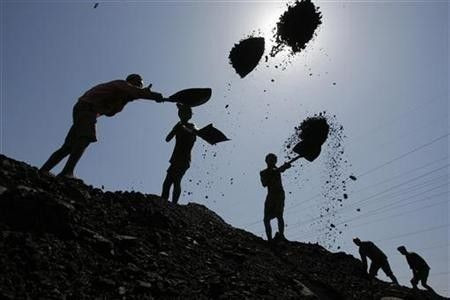CAG Warns of Billion-Dollar Losses on Coal, Airport Deals

The Comptroller and Auditor General (CAG) accused the government on Friday of allocating coal blocks, power projects and land for Delhi's flagship airport at a fraction of market prices, potentially costing the exchequer tens of billions of dollars in lost revenues.
The Bharatiya Janata Party (BJP) sought to link Prime Minister Manmohan Singh personally to one report which suggested private companies made windfall gains of about $33 billion owing to the underpriced sale of coal fields between 2004 and 2009.
The opposition demanded Singh's resignation over the affair, dubbed "coalgate" by the media, since he was in charge of the coal ministry in 2006 when the sale was underway.
"We want an explanation from the prime minister who was in charge of the Coal Ministry during the period of sale," BJP leader Rajiv Pratap Rudy told reporters after the report was released.
Singh's government maintains it was simply following established policy, and before the report was released, Singh denied there had been wrongdoing. He is not expected to resign.
"There couldn't have been a more transparent method of allocating coal blocks" at that time, said coal minister Shriprakash Jaiswal.
In a draft of its report leaked earlier this year, the state auditor estimated private companies' "windfall" gain from allocations had amounted to a much larger figure, $211 billion.
The same auditor uncovered corrupt practices two years ago in the sale of telecoms licences. The telecoms sale may have cost the government up to $36 billion.
Shares in Reliance Power, India's second-largest power producer by market value, tumbled almost 6 percent on Friday after they were mentioned by the CAG in the auditor's reports which were presented in parliament.
In another report to parliament, CAG said airport land was allocated at a tenth of its market value, giving the developers an undue profit of $4.3 billion.
Shares in GMR Infrastructure Ltd, who the auditor said was sold airport land too cheaply, fell sharply. Both GMR and Reliance denied they had been unfairly favoured by the government.
AIRPORT AND COAL
India has for years allocated coal blocks directly to companies on the basis of recommendations by state governments. Since 2004 the government has said it will change to more transparent auctions, but had not done so even in February of this year, the report said.
"The procedure followed for allocation of coal blocks to captive consumers lacked transparency as the allotments ... were made merely on the basis of recommendation from state governments and other administrative ministries without ensuring transparency and objectivity," CAG said in its report.
The coal ministry disputed the auditor's calculations, which were based on average extractable reserves. The ministry said the many of the fields in question had difficult geological conditions and hence higher costs of production.
"It is very sad that everything of the past is questioned today ... If it is wrong, please fix it. But I'm only saying, why now?" said Anil Sardana, managing director of Tata Power whose shares fell 4 percent after the company was named a beneficiary in the auditor's coal report.
Other critics of the auditor including market analysts said its calculations are based on the cost of missed opportunities, not tangible losses. They argue consumers would face more expensive services if the government sought to reap windfall gains from resource sales.
The auditor said Reliance Power benefited from a government decision allowing the power producer to use surplus coal from its captive block for another project it was not meant for.
The auditor said Reliance, controlled by billionaire Anil Ambani, gained 290 billion rupees in benefit from the decision.
The central auditor also pulled up the government for what it said was unduly favouring the GMR Infrastructure Ltd led consortium that was awarded the contract for the upgrade of the international airport in New Delhi in 2006.
The Delhi International Airport (DIAL) joint venture of GMR Group, Airports Authority of India, Germany's Fraport and Malaysia Airports Holdings Berhad, has a mandate to develop, operate and maintain the airport for a term of 30 years extendable by another 30 years.
GMR Infrastructure's shares fell as much as 4.2 percent after the report was released.
The auditor said the consortium was granted rights for commercial use of 240 acres of land worth 240 billion rupees against an equity infusion into the project of just about a tenth, 24.5 billion rupees. The consortium expected to generate revenue of 883.37 billion rupees for itself.
"Delhi International Airport Private Ltd (DIAL) has NOT received any undue benefits from the government before, during or after the bidding process," GMR Infrastructure said in a statement.
© Copyright Thomson Reuters 2024. All rights reserved.





















